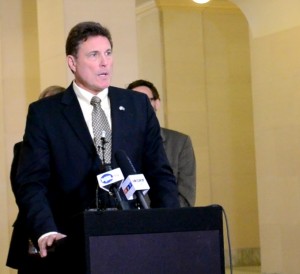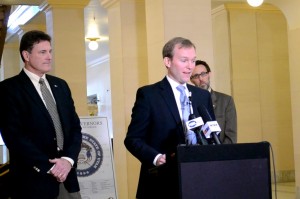Although the Utah Legislature has not adopted the full Medicaid expansion, a Utah lawmaker wants to extend full health care coverage to Utah’s poorest.
Rep. Jim Dunnigan, R-Taylorsville, spoke briefly about his goals during a news conference this week. Dunnigan’s bill will initially cover 16,000 of the “most deserving, (for those in) extreme poverty.”

HB437 will give a treatment path for those who are struggling with substance abuse and are in the justice system. The bill would also give homeless people in Utah an opportunity to receive health care and the opportunity for them to become productive and self-reliant.
Several Medicaid bills have been rejected in Utah in the past, and most observers say this bill may be the best chance for Medicaid expansion in Utah.
During the news conference, five speakers spoke in support of the bill.
Zions Bank executive vice president Lori Chillingworth said Dunnigan’s bill would help Utah’s impoverished.
“Healthy workforce is necessary for a productive economy,” Chillingworth said. “The business community supports Medicaid expansion because it’s good for Utah’s economy. It’s good for employers, and it’s good for employees.”
David Litvack, speaking for Salt Lake City Mayor Jackie Biskupski, expressed enthusiasm for the bill.
“(HB437) is our best opportunity for this legislative session to ensure that the poorest of the poor in our state get healthcare coverage,” Litvack said.
Litvack said HB437 is humane and compassionate but also makes sense economically.
Salt Lake County Sheriff Jim Winder said the best way to keep people out of jail is to provide services, which is why he said he favors the bill.

Salt Lake County Mayor Ben McAdams said the bill would save taxpayers money.
“Research shows that every dollar we spend on disorder treatment(s) saves $4 in healthcare costs and $7 in law enforcement and other criminal justice costs.”
Dunnigan thanked those from across the political spectrum for supporting the bill.
“This is a great effort of bipartisanship and people,” Dunnigan said. “I would like to say: Policy above politics is a great example.”




